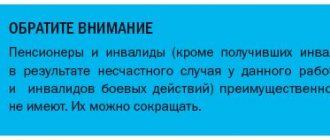Definition of the term “warranty period”
Dictionaries and legal literature offer the following options for defining the concept of “warranty period”:
- warranty period - a period of time during which the manufacturer of a product or its seller guarantees its compliance with the requirements of the contract, quality indicators, and passport data. A guarantee of normal uninterrupted operation, reliable operation, preservation of the required properties, and suitability for use during the warranty period is issued subject to compliance by the buyer or consumer with the conditions of storage and use of the product. Distinguish; a) the guaranteed shelf life of products, goods that tend to lose the necessary qualities during storage; b) the warranty period for the operation of products, goods (machines, equipment, devices, furniture) that change the qualities and properties they require in the process of industrial and domestic use; c) the guaranteed shelf life of goods whose consumer properties decrease over time. (Raizberg B.A., Lozovsky L.Sh., Starodubtseva E.B.. Modern economic dictionary. - 2nd ed., revised M.: INFRA-M. 479 p.. 1999.);
- guarantee period - in civil law, the period of time provided for by contract or law during which the manufacturer (performer, seller) guarantees that the product meets the quality requirements under the sales contract and preserves the consumer properties of the work performed or service provided. If defects in a product, work or service are discovered after the expiration of the warranty period, then, as a rule, the obligation of the manufacturer (performer, seller) to satisfy the consumer’s demands regarding the defects of the product (work, service) ceases. (Encyclopedia of Law. 2015.);
- warranty period - in civil law, the period of time during which the product must meet the quality requirements under the sales contract, and work and services must retain their consumer properties. Installed on products intended for long-term use or storage. The discovery of defects in a product, work or service after the expiration of the warranty period terminates (as a general rule) the obligation of the manufacturer (performer, seller) to satisfy consumer demands regarding defects in the product (work, service) (Articles 18 and 29 of the Law of the Russian Federation “On the Protection of Consumer Rights” dated February 7, 1993) (Big Legal Dictionary. - M.: Infra-M. A. Ya. Sukharev, V. E. Krutskikh, A. Ya. Sukharev. 2003.).
- The warranty period is the period of time during which the manufacturer, performer, seller, authorized organization or authorized individual entrepreneur, importer are responsible for any (simple, significant) defects of the goods, work, services, unless they prove that they arose after the transfer of the goods, the result of work to the consumer, due to the consumer’s violation of the rules of use, storage or transportation of goods, the result of work, actions of third parties or force majeure (Agafonova N.N. All about consumer rights. M.: Prospekt, 2021. P. 33.).
Establishing a warranty period is not mandatory. The warranty period is established by the manufacturer (performer) in its technical documentation (agreement with the consumer) and is calculated in time units.
Unlike the service life and shelf life, the warranty period can be established for any goods, is purely commercial in nature, and is a means of competition in the market.
The law does not directly determine the duration of the periods mentioned in Art. 5 of the Law on the Protection of Consumer Rights, as well as methods for determining their specific (absolute) duration.
The concept of “warranty period” in the Civil Code of the Russian Federation and the law on the protection of consumer rights
The warranty period is understood as the period during which, if a defect is detected in the product (work), the manufacturer (performer), seller, authorized organization or authorized individual entrepreneur, importer are obliged to satisfy the consumer’s requirements established by Art. Art. 18 and 29 of the Law (clause 6 of Article 5 of the Law on Protection of Consumer Rights).
Clauses 6 - 8 art. 5 of the Law “On the Protection of Consumer Rights” are interconnected with the norms of the Civil Code of the Russian Federation on the quality of goods.
Article 470 of the Civil Code of the Russian Federation “Guarantee of the quality of goods” determines the seller’s obligation to transfer to the buyer the goods, which must meet the requirements provided for in Art. 469 of the Civil Code of the Russian Federation. In this case, the conformity of the goods with these requirements is determined by the moment of transfer to the buyer, unless another moment of determining the conformity of the goods with these requirements is not provided for in the purchase and sale agreement, and within a reasonable period must be suitable for the purposes of its use.
According to paragraph 2 of Art. 470 of the Civil Code of the Russian Federation, if the purchase and sale agreement provides for the provision by the seller of a guarantee of the quality of the goods, the seller is obliged to transfer to the buyer the goods, which must meet the requirements provided for in Art. 469 of the Code, for a certain time established by the contract ( warranty period ).
It can be said that the norms of Art. 5 of the Law on the Protection of Consumer Rights on the warranty period and the corresponding norms of the Civil Code of the Russian Federation define the concept of a warranty period using its various characteristics. Taking into account the norm of paragraph 2 of Art. 470 of the Civil Code of the Russian Federation and the rules of paragraph 6 of Art. 5 of the Law, the warranty period of a product can be defined as the product’s compliance with the requirements provided for in Art.
469 of the Civil Code of the Russian Federation, for a certain time, before the end of which, in the event of a defect in the product, the manufacturer and seller are obliged to satisfy the consumer’s requirements established by Articles 18 and 29 of the Law on the Protection of Consumer Rights.
Ensuring warranty obligations
02.05.2020
The topic of warranty requirements continues to worry clients of the Consulting Center in the field of procurement "Zakon.guru", as well as ordinary users of the site. Interest in the topic did not fade away, and even increased somewhat after amendments were made to Law No. 44-FZ, adopted by Federal Law No. 124-FZ of April 24, 2020 (hereinafter referred to as Law No. 124-FZ).
Let us recall that from July 1, 2021, Law No. 44-FZ established the customer’s obligation to demand from the supplier (contractor, performer) the provision of warranty obligations for the contact, if the technical specifications established warranty requirements. From July 1, 2021, this obligation has been replaced by the customer’s right (Law No. 124-FZ). However, questions regarding the topic of ensuring warranty obligations remain. We will try to consider the main ones in this article.
Types of product quality guarantee
The legal literature notes that the Civil Code of the Russian Federation distinguishes between two types of product quality guarantee provided by the seller to the buyer:
- legal guarantee (clause 1 of article 470 of the Civil Code of the Russian Federation);
- contractual guarantee (warranty period) (clause 2 of article 470 of the Civil Code of the Russian Federation).
A contractual guarantee of the quality of goods with a certain period of preservation of the quality of the goods has advantages. The warranty period is clearly established by the manufacturer; its duration does not depend on the discretion of the court.
Advantages of having a warranty period for a product
The undoubted advantage of having a warranty period for a product (work) is the rule: if the seller provides a quality guarantee, then during the warranty period the buyer is not required to prove that the defects of the product arose before its purchase. In this case, the seller is responsible for the defects of the goods unless he proves that the defects of the goods arose after its transfer to the buyer as a result of the buyer’s violation of the rules for using the goods or storing them, or the actions of third parties, or force majeure (clause 2 of Article 476 of the Civil Code of the Russian Federation).
The requirements established by Art. 18 of the Law on Protection of Consumer Rights, the following may be presented:
- during the warranty period for the product - in this case, the seller bears the burden of proving the absence of his fault;
- after the expiration of the warranty period , but within two years from the date of transfer of the goods to the consumer, while the burden of proving the seller’s guilt falls on the latter.
Thus, the distribution of the burden of proof depends on whether a warranty period was established for the product (work, service), as well as on the time of discovery of the defects: the defects arose before or after the transfer of the goods to the buyer.
How to prescribe the procedure and terms of provision
When determining the procedure and period for providing security for the fulfillment of warranty obligations under 44-FZ, please note that according to Part 7.1 of Art. 94 44-FZ, you can sign an acceptance certificate when the supplier has provided warranty obligations. In Part 3 of Art. 96 44-FZ stipulates that for this, the supplier transfers a bank guarantee for warranty obligations under the 44-FZ contract or sends money to the customer’s account. As for the period, one month is added to the service period, then the minimum period for “freezing” the customer’s money or the validity of the bank’s guarantee will be obtained.
For example, if in government procurement of construction work for a capital construction project, the state customer prescribes a warranty period for the work performed under 44-FZ for 5 years under Art. 756 of the Civil Code, then the contractor will have to obtain a bank guarantee for 5 years + 1 month. or “freeze” money for this period in the customer’s personal account.
The customer requires security for obligations under the contract, even if the contract is not enforced. For example, in an electronic request for quotations for the supply of computer equipment. With this method of determining the supplier, establishing contract security is the customer’s right, not an obligation.
IMPORTANT!
Both government institutions and small businesses (SMB) provide a guarantee if they fail to provide at least 3 contracts completed without complaints, which in total constitute the NMCC. This is enshrined in parts 8 and 8.1. Art. 96 of the Law on the Contract System.
The warranty applies to the product with components
According to paragraph 3 of Art. 470 of the Civil Code of the Russian Federation, the warranty period applies (unless the manufacturer determines otherwise) to all parts that make up the product (the so-called components).
Paragraph 2 of paragraph 3 of Article 19 of the Law contains a rule regulating situations when the warranty periods for the main product and its components do not coincide. Thus, the consumer has the right to make claims related to product defects discovered during the longer of these periods, regardless of where exactly the defect was discovered - in a component of the main product or its components.
However, it should be borne in mind that in the event of claims related to defects in an element of the product for which the warranty period has expired, the consumer will need to prove the seller’s guilt in the occurrence of such defects.
Buyer's rights
Russian legislation provides that the buyer, after purchasing the goods, has the right to:
- Receive a refund of the full or partial cost of the product from the seller of the defective product.
- Warranty repairs at the expense of the seller.
- Receive a similar product in exchange for a low-quality product.
- Expect a commensurate reduction in cost.
It is the responsibility of the seller, product manufacturer or importing company to respond to warranty obligations if the goods were imported into the Russian Federation from abroad.
Deadlines for detecting product defects and the start of the warranty period
Clause 1 of Art. 19 of the Law, as well as Art. 477 of the Civil Code of the Russian Federation establishes a rule according to which the right to make claims regarding the inadequate quality of a product arises from the consumer if the defect is discovered during the warranty period or expiration date .
In other words, the consumer can make demands to replace the product, make warranty repairs to the product, reimburse the costs of eliminating defects, reduce the price or return the price paid for the product if defects in the product are discovered within the warranty period or its expiration date.
But the absence of these deadlines does not deprive the consumer of the right to present claims under Art. 18 of the Law “On Protection of Consumer Rights”. Paragraph. 2 p. 1 art. 19 of the Law establishes for these cases a maximum two-year period for detection of defects, calculated from the day the goods are transferred to the consumer, unless longer periods are established by other laws or an agreement. This rule must be applied together with the rule in paragraph. 1 clause 6 art. 18 of the Law, which states that the burden of proving the causes and time of occurrence of a defect in the absence of a warranty period is placed on the consumer.
In para. 2 p. 1 art. 19 of the Law uses the term “reasonableness of time”, which depends on the characteristics of the product itself. Thus, for perishable goods and durable goods, the reasonableness of the period for detecting defects within two years will be different.
The beginning of the warranty period of a product is considered to be the moment the product is transferred to the buyer, unless otherwise provided by the purchase and sale agreement (Article 471 of the Civil Code of the Russian Federation, clause 2 of Article 19 of the Law).
The warranty period for so-called seasonal goods (for example, shoes) is calculated differently: the beginning of the warranty period is recognized as the moment the corresponding season begins. The specific timing of the onset of seasons is determined by the constituent entities of the Russian Federation, taking into account the specifics of their climatic conditions.
For example, the Moscow Government adopted Resolution No. 466-PP dated July 16, 2013 “On establishing the timing of the onset of seasons for calculating the warranty periods and service life of seasonal goods in the city of Moscow.” The specified Resolution of the Moscow Government established the following dates for the onset of seasons for calculating the warranty periods and service life of seasonal goods in the city of Moscow:
- winter season - from November 1;
- spring season - from March 1;
- summer season - from May 1;
- autumn season - from September 1.
When selling goods by samples, by mail, as well as in other cases when the moment of concluding a sales contract and the moment of transfer of the goods to the consumer do not coincide, the warranty period and service life are calculated from the day the goods are delivered to the consumer (paragraph 3, clause 2, art. 19 of the Law). In addition to the sale of goods based on samples, distance selling is possible (see Article 26.1 of the Law).
If the consumer is deprived of the opportunity to use the product due to circumstances depending on the seller (for example, the product requires special installation, connection or assembly, or has defects), the warranty period does not run until the seller eliminates such circumstances. If the day of delivery, installation, connection, assembly of goods, elimination of circumstances dependent on the seller, due to which the consumer cannot use the goods for their intended purpose, cannot be determined, the warranty period is calculated from the date of conclusion of the purchase and sale agreement (paragraph 3, paragraph 2, article 19 Law).
Various options for the start of the warranty period and service life are subject to a general idea - they begin to flow from the day when the consumer received a real opportunity to use the thing and extract useful properties from it.
How is the GS calculated according to the Civil Code?
The duration of the warranty period under the Civil Code by virtue of clause 1 of Art.
471 begins from the moment when the goods were handed over to the buyer. Another rule may be written into the contract.
If a person who purchased a product with an established warranty is unable to use it due to circumstances depending on the seller, the warranty period in civil law does not begin to run until the specified circumstances are eliminated.
As a general rule (clauses 3, 4 of Article 471 of the Code):
- the warranty for the component product is equal to the GS defined for the main product;
- The warranty for a new product or its component transferred instead of a product in which faults were identified during the Civil War is determined to be equal to the warranty for the original product or component.
The warranty period is calculated taking into account the rule on its extension for the period of warranty repairs, which we described above. The warranty is extended unless another rule is specified in the contract, provided that the seller was notified of the identified defects in the product within a reasonable time.
If the seller is not notified, the latter, by virtue of clause 2 of Art.
483 of the Code may refuse warranty repair or replacement of goods if it proves that such failure to notify:
- made it impossible to satisfy the buyer's requirements;
- entailed disproportionately higher costs.
Warranty period for work performed (services)
Requirements related to deficiencies in the work performed (service provided) may be submitted by the consumer:
- upon acceptance of the work performed (service provided);
- during the performance of work (provision of services).
The procedure for acceptance by the customer of work performed by the contractor is set out in Art. 720 Civil Code of the Russian Federation.
In the event that it is impossible to detect deficiencies at the time of acceptance of the work performed (service provided), claims can be made within the time limits established by clause 3 of Art. 29 of the Law on Protection of Consumer Rights.
The consumer has the right to make claims related to deficiencies in the work performed (service provided) if they are discovered:
- during the warranty period;
- in the absence of a warranty period, within a reasonable period, within 2 years from the date of acceptance of the work performed (service provided) or 5 years in relation to defects in the structure and other real estate.
The result of the work is a tangible result for which a warranty period can be established (for example, a tailored suit, repaired shoes, household appliances, watches, etc.). It seems that this concept can also be applied to services that have a tangible (material) result (for example, medical services related to prosthetics, manicure services, certain types of hairdressing services, etc.).
In accordance with paragraph 4 of Art. 29 of the Law on the Protection of Consumer Rights, two situations should be distinguished:
- when the contractor has not established a warranty period for the result of the work (service) . In this case, the contractor is responsible for the defects only if the consumer proves that they arose before he accepted the work (service) or for reasons that arose before that moment;
- when the guarantee period is established . In this case, the burden of proving the cause of the defects lies with the contractor. The contractor must prove that the defects arose after the consumer accepted the work (service) as a result of his violation of the rules for using the result of the work (service), actions of third parties or force majeure. If the contractor cannot prove this, then he will have to bear responsibility for the shortcomings of the work (service).
Contract
When concluding a contract, the following obligations are recognized:
- Retention of part of the customer's funds.
- Compensation for losses incurred by the customer in the event of detection of inadequate quality of work performed.
- Repeated execution of the agreed work in the event that its quality does not meet the requirements of Russian legislation and the terms of the concluded contract, and repair work is not possible.
- Warranty repairs at the expense of the contractor if defects are detected during the entire warranty period.
Consumer requirements when significant deficiencies in the work (service) are detected
Clause 6 of Art. 29 of the Law on the Protection of Consumer Rights is devoted to the actions of the consumer when he discovers significant deficiencies in the work (service).
In this case, the consumer will have the right to make a demand to the contractor for the free elimination of detected deficiencies . In this case, the consumer bears the burden of proof that the defects arose before his acceptance of the result of the work (service) or for reasons that arose before that moment.
At the same time, conditions are provided under which a demand can be made for the gratuitous elimination of detected deficiencies: if such deficiencies are discovered after 2 years (5 years in relation to real estate) from the date of acceptance of the result of the work (service), but within the established limits for the result of work (service) service life or for 10 years from the date of acceptance of the result of work (service) by the consumer, if the service life is not established.
If this consumer requirement is not satisfied within 20 days from the date of its presentation by the consumer or the detected defect is irreparable, the consumer, at his choice, has the right to present one of the following requirements:
- a corresponding reduction in the price for the work performed (service provided);
- reimbursement of expenses incurred by him to eliminate deficiencies in the work performed (service provided) on his own or by third parties;
- refusal to fulfill the contract for the performance of work (provision of services) and compensation for losses.
After renovation work
In the event of a breakdown of a product that is under warranty, the date it was submitted for repair is necessarily recorded, and the period during which the consumer was not able to actually use it due to the product being repaired is deducted from the warranty period.
For example, if the initial warranty period for a product is 2 years, if it breaks down and is sent for repairs for 45 days, the warranty period of the product is also extended by the time spent on repair work.
If the product belongs to the category of durable goods, the seller undertakes to provide the consumer with a replacement for the entire period of repair work. Delivery of the replacement product must be made within three days from the date the product is submitted for repair at the expense of the seller.
The buyer has the right to notify the seller of defects discovered by him in the purchased goods during the entire established warranty period. If the warranty period was less than 24 months, and the defect was discovered by the consumer after the expiration of the warranty period, but within 2 years, the seller is also responsible for the defects discovered.







